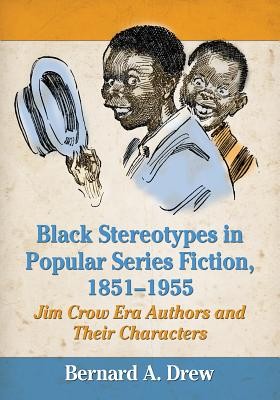
- We will send in 10–14 business days.
- Author: Bernard a Drew
- Publisher: McFarland & Company
- ISBN-10: 0786474106
- ISBN-13: 9780786474103
- Format: 17.5 x 25.2 x 2 cm, minkšti viršeliai
- Language: English
- SAVE -10% with code: EXTRA
Black Stereotypes in Popular Series Fiction, 1851-1955 (e-book) (used book) | bookbook.eu
Reviews
Description
Even well-meaning fiction writers of the late Jim Crow era (1900-1955) perpetuated racial stereotypes in their depiction of black characters. From 1918 to 1952, Octavus Roy Cohen turned out a remarkable 360 short stories featuring Florian Slappey and the schemers, romancers and ditzes of Birmingham's Darktown for The Saturday Evening Post and other publications. Cohen said, I received a great deal of mail from Negroes and I have never found any resentment from a one of them. The black readership had to be satisfied with any black presence in the popular literature of the day. The best known white writers of black characters included Booth Tarkington (Herman and Verman in the Penrod books), Irvin S. Cobb (Judge Priest's houseman Jeff Poindexter), Roark Bradford (Widow Duck, the plantation matriarch), Hugh Wiley (Wildcat Marsden, the war veteran who traveled the country in the company of his goat) and Charles Correll and Freeman Gosden (radio's Amos 'n' Andy). These writers deservedly declined in the civil rights era, but left a curious legacy that deserves examination. This book, focusing on authors of series fiction and particularly of humorous stories, profiles 29 writers and their black characters in detail, with brief entries covering 72 others.
EXTRA 10 % discount with code: EXTRA
The promotion ends in 23d.03:28:25
The discount code is valid when purchasing from 10 €. Discounts do not stack.
- Author: Bernard a Drew
- Publisher: McFarland & Company
- ISBN-10: 0786474106
- ISBN-13: 9780786474103
- Format: 17.5 x 25.2 x 2 cm, minkšti viršeliai
- Language: English English
Even well-meaning fiction writers of the late Jim Crow era (1900-1955) perpetuated racial stereotypes in their depiction of black characters. From 1918 to 1952, Octavus Roy Cohen turned out a remarkable 360 short stories featuring Florian Slappey and the schemers, romancers and ditzes of Birmingham's Darktown for The Saturday Evening Post and other publications. Cohen said, I received a great deal of mail from Negroes and I have never found any resentment from a one of them. The black readership had to be satisfied with any black presence in the popular literature of the day. The best known white writers of black characters included Booth Tarkington (Herman and Verman in the Penrod books), Irvin S. Cobb (Judge Priest's houseman Jeff Poindexter), Roark Bradford (Widow Duck, the plantation matriarch), Hugh Wiley (Wildcat Marsden, the war veteran who traveled the country in the company of his goat) and Charles Correll and Freeman Gosden (radio's Amos 'n' Andy). These writers deservedly declined in the civil rights era, but left a curious legacy that deserves examination. This book, focusing on authors of series fiction and particularly of humorous stories, profiles 29 writers and their black characters in detail, with brief entries covering 72 others.


Reviews